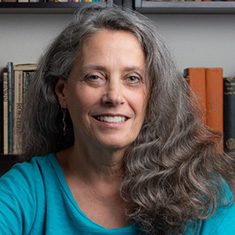History in the making
Dec. 20, 2018 — From the history podcast she co-hosts, to the history website she edits, to the innovative courses she teaches, Joan Neuberger ’75, professor of history at the University of Texas at Austin, has devoted much of her time this past decade to making history accessible.
 Joan Neuberger ’75
Joan Neuberger ’75
(photo (c) Matt Valentine)
The Russian history scholar was recognized for this year by the American Historical Association with the Herbert Feis Award for distinguished contributions to public history.
“Joan has worked tirelessly over the years to bring history to a larger public,” says Jacqueline Jones, professor and chair of UT Austin’s history department. “The Feis award recognizes the creativity, hard work, and technological sophistication she brings to all these efforts.”
Neuberger majored in Russian at Grinnell, then earned an M.A. and Ph.D. in Russian history from Stanford University.
“My brother is two years older than me, and one of his friends had been dragged to Grinnell by his mom, Roberta “Bobette” Brown Sanders ’45, to check out the campus,” Neuberger says. “This was about 1968, and he said that Grinnell seemed like a hippie oasis in the middle of the cornfields. That didn’t appeal to him, but it sounded great to me. Grinnell was the only college I wanted to go to, and it turned out to be the perfect place for me.”
Though she’d read a lot of Russian literature in high school in suburban New York, Neuberger came to Grinnell planning on being an English major. But she changed direction after taking an intensive course on the Soviet Union that focused on politics, literature, and history. It was team taught by retired professor Bob Grey, and the late Greg Guroff and Dennis Whelan.
“I loved the idea of an experimental course where you could study one thing at a time in-depth,” she says. “Because of that course, I ended up majoring in Russian language and literature. I went to Leningrad my senior year at Grinnell and was fascinated by it. It had this amazing culture and a really oppressive, inhumane political system, and I was really curious how that happened.”
Her primary interest today is the history of Russian culture, much of it focusing on film. Neuberger’s latest book “This Thing of Darkness: Eisenstein’s Ivan the Terrible in Stalin’s Russia,” is a historical and political analysis of Soviet filmmaker Sergei Eisenstein’s final film.
When her department chair proposed a new ‘history book blog’ in 2010 – now known as Not Even Past, Neuberger volunteered for the job.
“I didn’t know what public history or digital history was about,” she admits. “We started the site for alumni and history buffs, but it’s ended up being popular also among other historians.”
There are monthly features on faculty research; book, film and television reviews; and stories about archival, visual, aural, and other historical documents. The site gets about 40,000 hits each month.
“Early on, we decided we were committed to the idea that we wanted to write about history as valuable in its own right, even when it’s not directly connected to contemporary events,” Neuberger says. “I wanted people to click on topics they didn’t know about.”
A podcast, 15 Minute History, is a spinoff of the site, co-founded by Neuberger and UT doctoral candidate Christopher Rose. The two interview scholars on a range of topics, from The Legacy of World War I in Germany and Russia, to Harvey Milk, Forty Years Later. Neuberger and Rose produce one interview every other week in a campus recording studio, and they’ve had more than 1 million downloads.
Thinking in Public is a website of projects that connect UT faculty, students, and their scholarship to the public. Front Porch Gatherings for example, bring community members together with faculty, nonprofit organizations, and religious and activist leaders to talk about issues faced by Austin’s underserved communities.
Neuberger’s Public and Digital History course introduces students to the vast archive of publically available historical information. In spring 2016, graduate students in her Public History Seminar focused on the infamous 1966 UT Tower shooting, and the results of their work are on the website Behind the Tower.
“I just think history is really interesting,” she says. “We (historians) tell really good stories, and we’re constantly coming up with new and interesting ways to look at the past and challenge people’s assumptions.”
—by Anne Stein '84
For your information:
The Herbert Feis Award is offered annually to recognize distinguished contributions to public history. Episodes of the podcast 15 Minute History can be heard here.
To read more alumni news, check out our news archive.